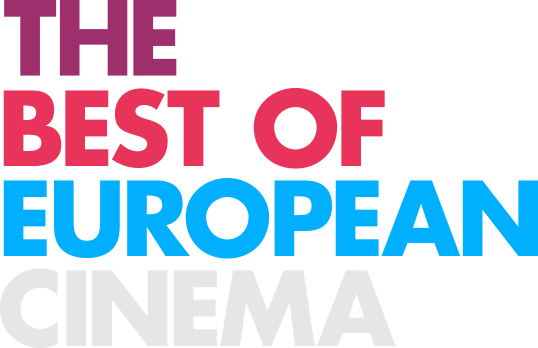Interview: Eren Aksu, Director of Cosmorama
In his second short film, Cosmorama (pictured), Turkish director Eren Aksu portrays his hometown Istanbul. A couple, relaxing on the shores of a closeby island, gazes upon the massive cityscape of Istanbul and unsuccessfully attempt to spot their house amongst the many others. The city – and its skyline in desaturated colours – is the main protagonist.
The film student at the Berlin University of Arts premiered his observational short in the German Competition at last year's International Short Film Festival Oberhausen. He has since travelled with it to Sarajevo Film Festival and recently screened it in competition at the International Short Film Festival Dresden where we sat down with the newcomer to talk about his perspective on Istanbul and how he came to live in Berlin.
Sabine Kues: How did you come to filmmaking?
Eren Aksu: When I started studying film in Istanbul I had this intention to become a cameraman in the beginning – before that I was a photographer.
In Turkey we don't really have these film schools but more film studies with a bigger practical part, I would say. In my university you could only choose a path in the last year. And I decided to make a short film – and that was my first film, actually. I was more interested in film theory and working on film narration and film genre – but only in the last year I wanted to make a short.
SK: Why did you then choose to go to the Berlin University of Arts?
EA: I wanted to get out of Istanbul and I wanted to move to Berlin. Yes, that's why the school attracted me. And Thomas Arslan was a plus. Of course I feel closer to this kind of filmmaking of the Berlin School. But then again, when I applied I didn't know that much about the Berlin School – I learned more about it when I was here.
SK: How did Cosmorama develop from the idea to the final film?
EA: As I said before, I just wanted to get out of Istanbul. There was a certain feeling I had about the city. I was feeling stuck, paralysed, unable to breath – so to say – and I wasn't seeing any future. I wasn't able to move in the city physically but at the same time it is a very lively city. It offers a lot. It lures you in. There are these two different sides to it. As soon as I arrived in Berlin I started taking notes about this feeling and making something on the island was already an idea before moving to Berlin. I came up with the basic idea of two people spending a day on the island and I wrote a very rough treatment in Berlin and then I went to Istanbul one summer and spent more time there and wrote a final version. I shot it with my close friends with a very small team and no money.
SK: Would you then say that the city is the protagonist of the film?
EA: Yes, I would say that. That is something that changed – in the script it was more about the couple and the day on the island and the mainland of Istanbul would just be a background element but during shooting and editing I wanted to make the city itself the protagonist. That's also why the title. The word means it's a room where the landscape of a city is exhibited. It's usually 360° exhibitions of city landscapes. And the film is about landscape, its changing and the importance of it, personally. That's why Cosmorama.
SK: You focus very much on the atmosphere in your film.
EA: My first film is even worse. The thing is, I'm more interested in moods, in atmospheres, or certain situations and not stories. At least, I haven't been so far. But I think with the next film, there is a little bit more character – again not so much dialogue – let's say a little bit more balanced in terms of story and mood. It is also a learning process.
SK: What was your first film about?
EA: It's really hard to say what it was about – it was just a mess. It was in Istanbul in an apartment, a building. The concept was: there is this light shaft in the middle of the buildings and every kitchen has a window opening to it. We have these kind of buildings in Istanbul a lot. With this space in the middle of the building, you hear voices, you smell things from other people. That objects fall down into this space and at the bottom you have these objects and dirt – everything piling up. It was about this space, basically. There was this woman living alone in one flat and she is being haunted by a box. It was like this simple Sisyphus story. This ever returning haunting thing that she is trying to get rid of by throwing it into this space but it comes back.
SK: It sounds very observational and architecture and space playing a big role in your films.
EA: Yes, I was watching a lot of gothic films like The Tenant by Roman Polanski. This was a film that I drew inspiration from back then.
SK: With the overall situation now in Turkey – is that a topic you also feel you want to discuss as a filmmaker?
EA: This will be a topic but in an indirect way, in an ambiguous way, let's say. I like being indirect. I usually like giving things time. Somehow I would like to find an angle which is universal. I don't want to make a film which can only make sense if you know the context. I don't want to be so specific.
SK: Will you continue keeping everything in your hands as a director, writer, editor and sometimes even colour-grading?
EA: No, I don't want to. I didn't have any money and I didn't want to ask anyone to do it for free. But with the next thing I will ask some editors from film schools. I'm thinking it would be nice to start working with film students. I'm really starting out now with filmmaking, I would say. I have three projects – it's a mess. [laughs] I didn't do anything for two years now, so I will have to be busy this year.
16 May 2017, by Sabine Kues






